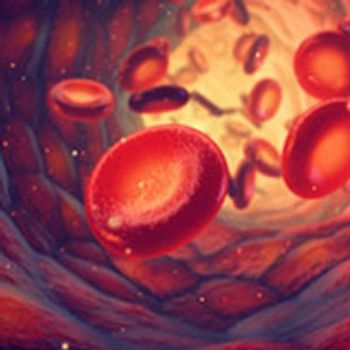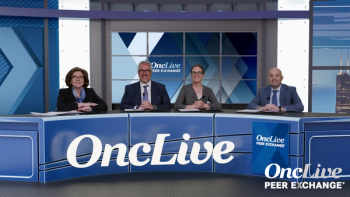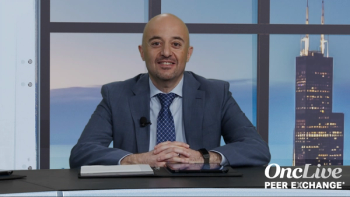
Myeloproliferative Neoplasms
Latest News

Azacitidine-Based Combinations Represent New Treatment Possibilities in MDS

European Commission Grants Orphan Drug Designation to Selinexor for Myelofibrosis
Latest Videos

CME Content
More News

Haris Ali, MD, discusses a phase 1 dose-escalation trial investigating the administration of selinexor in combination with ruxolitinib for patients with treatment-naïve myelofibrosis.

Luspatercept produced favorable safety and long-term efficacy in patients with untreated lower-risk myelodysplastic syndromes, irrespective of subtype.

Patients with polycythemia vera, a myeloproliferative neoplasm associated with JAK2 mutations and overproduction of red blood cells, often require regular therapeutic phlebotomies to avoid thrombosis.

Momelotinib induced superior 24-week overall survival rates compared with danazol in thrombocytopenic, symptomatic, and anemic patients with myelofibrosis.

Haris Ali, MD, discusses the investigation of ruxolitinib and navitoclax combination therapy in myelofibrosis.

Treatment with GB2064 monotherapy for at least 6 months led to a reduction in collagen fibrosis of the bone marrow of at least 1 grade in 4 of 5 evaluable patients with myelofibrosis, according to topline findings from a planned intermediate assessment of the phase 2a MYLOX-1 trial.

Treatment with rusfertide generated sustained hematocrit control at levels below 45% in patients with polycythemia vera, leading to a reduced need for repeated phlebotomy and eliminating this need in some patients, according to findings from 2 phase 2 clinical trials.

Andrew Kuykendall, MD, discusses the evolution of prognostication factors in primary and secondary myelofibrosis.

John O. Mascarenhas, MD, discusses the investigation of pelabresib in myelofibrosis.

Dr Verstovsek discusses the FDA approval of pemigatinib in myeloid/lymphoid neoplasms with FGFR1 rearrangements, the transformative effects of pemigatinib, and the importance of identifying chromosomal abnormalities in patients with this aggressive disease.

Azacitidine plus venetoclax showed encouraging activity in patients with high-risk myelodysplastic syndromes or chronic myelomonocytic leukemia.

Emavusertib elicited antitumor activity when given as a monotherapy in patients with relapsed/refractory acute myeloid leukemia or high-risk myelodysplastic syndrome that harbored a spliceosome or FLT3 mutation.

A panel of hematology cancer experts discuss the current treatment landscape and novel emerging therapies for patients with myelofibrosis.

The FDA has granted permission for enrollment to resume in the monotherapy phase 1a portion of the phase 1/2 TakeAim Leukemia trial evaluating emavusertib in relapsed/refractory acute myeloid leukemia or high-risk myelodysplastic syndromes.

Rami Komrokji, MD, expands on the disease factors and treatment options for lower-risk and higher-risk myelodysplastic syndromes, and highlights other key updates in chronic lymphocytic leukemia, mantle cell lymphoma, diffuse large B-cell lymphoma, and myelofibrosis.

Liquid biopsy using targeted next-generation sequencing for early diagnosis and monitoring of patients with myeloid neoplasms is effective and detects chromosomal structural abnormalities.

The panelists conclude their discussion by highlighting investigational agents to look forward to.

Rami Komrokji, MD, presents to the panel a second clinical scenario of a 74-year-old with cytopenic myelofibrosis.

The FDA has placed a full clinical hold on a phase 1 dose escalation trial investigating the BRG1/BRM inhibitor FHD-286 in patients with relapsed/refractory acute myeloid leukemia or myelodysplastic syndrome.

Jacqueline S. Garcia, MD, discusses the role of ruxolitinib (Jakafi) in myelofibrosis.

John Mascarenhas, MD, discussed the effect of the data from MANIFEST on the treatment landscape and the future of adding active agents to ruxolitinib for treatment of myelofibrosis.

A look at the potential treatment options for a patient with myelofibrosis who progresses after first-line therapy.

Key opinion leaders discuss how they would approach treating a 67-year-old with myelofibrosis, presenting with splenomegaly.

Andrew Ip, MD, discusses the use of targeted next-generation sequencing in detecting chromosomal structural abnormalities in patients with myeloid neoplasms.

Treatment with avapritinib led to clinically meaningful and statistically significant improvements in patient-reported symptoms and objective measures of mast cell burden in patients with non-advanced systemic mastocytosis.







































